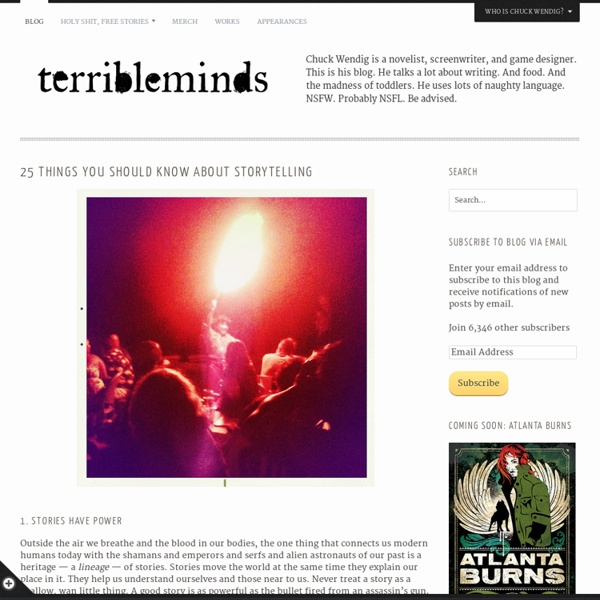How to Write with Style: Kurt Vonnegut’s 8 Keys to the Power of the Written Word
Find a Subject You Care About Find a subject you care about and which you in your heart feel others should care about. It is this genuine caring, and not your games with language, which will be the most compelling and seductive element in your style. I am not urging you to write a novel, by the way — although I would not be sorry if you wrote one, provided you genuinely cared about something.
25 Virtues Writers Should Possess
1. A Wild And Unfettered Imagination This one goes up front: the bubbling turbid stew that comprises your brain-mind combo must possess an endless array of unexpected ideas. Your head should be an antenna receiving frequencies from the furthest-flung reaches of Known Creative Space.
Data Mining Novels Reveals the Six Basic Emotional Arcs of Storytelling
Back in 1995, Kurt Vonnegut gave a lecture in which he described his theory about the shapes of stories. In the process, he plotted several examples on a blackboard. “There is no reason why the simple shapes of stories can’t be fed into computers,” he said.
(More) tips for writing well (Austin Govella at Thinking and Making) - StumbleUpon
Published Wed, Jul 8, 2009 by Austin Govella. Updated Wed, Jul 8, 2009. As an editor, I’ve noticed several recurring bad habits you heathens would do well to disabuse yourselves of immediately. Almost without exception, these bad habits instantiate themselves as a series of stock phrases and constructions that reflect a lack of focus, a lack of fully developed argument, or the kind of intellectual laziness that sets in as you slog through your first draft.
Kids explain how banned and challenged books helped them and even saved their lives / Boing Boing
By Joan Bertin and Millie Davis Banned Books Week has come and gone but we can be sure of one thing: the coming year will be marked by challenges to the same kinds of books that were controversial this year, and in years past. report this ad Controversies over what books are taught in class or shelved in the school library typically start when an adult—usually a parent or community member—feels that a book selected by teachers and librarians is inappropriate, offensive or objectionable.
25 Things Every Writer Should Know
An alternate title for this post might be, “Things I Think About Writing,” which is to say, these are random snidbits (snippets + tidbits) of beliefs I hold about what it takes to be a writer. I hesitate to say that any of this is exactly Zen (oh how often we as a culture misuse the term “Zen” — like, “Whoa, that tapestry is so cool, it’s really Zen“), but it certainly favors a sharper, shorter style than the blathering wordsplosions I tend to rely on in my day-to-day writing posts. Anyway. Peruse these.
10 books that will make you a better writer (and why)
Last week, I wrote about 25 habits that will make you a better writer. This week, I thought — let’s dive into books. After twenty-plus years writing, I’ve collected some resources that I absolutely couldn’t do with out. I love borrowing books. But there are some books that a writer really should have in their own personal for-keeps libraries.
15 Top Writing Guides for Novelists
by Mark Nichol There comes a time when you have to put down other people’s books and start writing your own. But if you don’t feel you’ve gotten to that point yet, or you’d just like a shot in the arm (or a more definitive blow to another part of your anatomy), explore these excellent writing workshops in print:
Iraqi Refugee Empowers Youth To Share Their Stories With 'Narratio'
When Ahmed Badr was 8 years old, his family fled Baghdad in the midst of the Iraq War. Writing helped him process his experience, so he started the website Narratio to give other young people the same opportunity. Ariel Edelman hide caption
Ten rules for writing fiction
Elmore Leonard: Using adverbs is a mortal sin 1 Never open a book with weather. If it's only to create atmosphere, and not a character's reaction to the weather, you don't want to go on too long. The reader is apt to leaf ahead looking for people.
The Craft of Character Development
Aimie K. Runyan As an author of historical fiction, my work must—almost by definition—begin with a concept.



